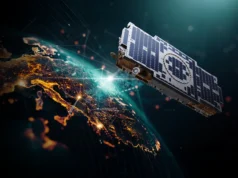The UK Space Agency, NASA and other partners have signed a historic agreement on the principles for exploration, science and commercial activities in space ahead of a future mission to the Moon.
According to UKSpace, the trade association of the British space industry, NASA’s Artemis programme aims to land the first woman and the next man on the Moon by 2024. Commercial and international partners will collaborate to achieve a sustainable presence on the lunar surface as a steppingstone to the first human mission to Mars.
“The UK will play a key role in this mission. Businesses across the UK will be involved in building the service module and habitation module of the Lunar Gateway, a new space station orbiting the moon, generating economic benefits and high-skilled jobs. The UK has already committed over £16 million for the first phase of the design of these elements.”
Science Minister Amanda Solloway said:
“The prospect of the first woman landing on the Moon in the coming years will be a source of inspiration for thousands of young people across the UK who may be considering a career in space or science. Today’s historic agreement, backed by £16 million of UK funding, underlines our commitment to strengthening the UK’s role in the global space sector, building on our existing strengths in satellites, robotics and communications to grow our economy and improve life on Earth.”
With numerous countries and companies conducting operations in space it is vital to establish a set of principles to govern the civil exploration and use of outer space.
The US worked with the UK, along with other spacefaring nations including Japan, Australia, Canada, Italy and the UAE, to develop the Artemis Accords, a set of principles to ensure a shared understanding of safe operations, use of space resources, minimising space debris and sharing scientific data.
James Cleverly, Minister for Defence and International Security at the Foreign, Commonwealth and Development Office, said:
“By signing the Artemis Accords, the UK is joining international partners to agree a common set of principles which will guide space exploration for years to come. This ground-breaking agreement will guide how states should operate in space, as envisaged in the Outer Space Treaty. The UK is at the forefront of international collaboration to explore and preserve outer space for future generations. We’re committed to keeping space – and the crucial space systems upon which our societies depend – safe and secure, by launching a landmark UN resolution to agree responsible behaviour for operating in space.”
While NASA is leading the Artemis programme, international partnerships with countries including the UK will play a key role in achieving a safe and sustainable human presence on the Moon, say UKSpace.
UK Space Agency CEO Graham Turnock, who signed the Artemis Accords during a virtual ceremony at the International Astronautical Congress (IAC), said:
“Signing the Accords is a strong signal of our intent to take a leading global role in civil space. We hope to deepen our relationship with the US when it comes to space and enhance the UK’s global influence in the space sector. This exciting step could open up new opportunities for UK companies and scientists to be part of NASA missions to the Moon and Mars.”











No Russia, China or India ? Isn’t that a bit like combating climate change here on earth without the involvement of the biggest polluters ?
Other nations are running their own programs. The US and UK is running theirs independently.
A amn and a woman on the moon by 2024. Sounds like wishful thinking
It’s not that far fetched, though it is going to be tight.
The Orion capsule not only in inventory it has already flown on EFT-1 uncrewed.
SLS, the rocket system that’s designed to launch Orion is already in inventory, as is the ESM (European Service Module) that will provide support to Orion. In fact all the hardware for Artemis I (the first uncrewed testflight around the moon) is build, and the hardware for the Artemis II mission is currently under construction (with lots of bits such as the SRB’s, and much of the SLS core stage already completed).
The big developments that need to be made still are the three landers (currently selected are DHLS, Starship and the ILV that need to be built and tested in the next four years, not unreasonable given the state of Starship at the moment), and the Gateway Lunar Hub (and even then the first two modules of the Lunar Gateway have already been contracted.
So yeah, landing the Artemis III mission on the moon in 2024 will be a tight squeeze, but far from just wishful thinking.
Hi Dern.. Interesting read. I just find the whole subject of space fascinating. Look forward to seeing what happens in the future.
It’s a good time to be interested in Space. With so many private companies starting up and launching from all around the world, the ISS established, NASA returning to the Moon, things are looking bright, and hopefully in 10-20 years we’ll be seeing some really cool developments.
Yeah, and man on the moon before the end of the 1960’s was too.
A moon landing by 1969 sounded like sci-fi when Kennedy announced it in the early 1960s, but it happened.
Its about time that UK became serious, again, about space including people in space.